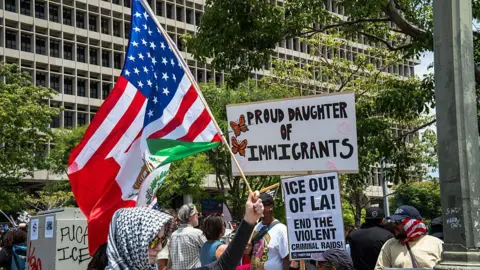Washington, D.C. – President Donald Trump’s renewed immigration crackdown is sending shockwaves through America’s workforce, with businesses and migrant workers expressing growing fear over what they call a sweeping and disruptive policy shift. The Trump migrant crackdown has already impacted labor availability, with sectors such as healthcare, construction, agriculture, and hospitality warning of mounting worker shortages.

Victor Moran, CEO of Total Quality, a Maryland-based cleaning firm with 1,200 employees, has already lost 15 workers after Trump revoked Temporary Protected Status (TPS) for migrants from Venezuela and Nicaragua. He fears hundreds more could be at risk if the Trump Migrant Crackdown widens.
“We are terrified,” said 73-year-old Justino Gomez, a TPS holder from El Salvador who has lived in the U.S. for three decades. Gomez fears that El Salvador might be next on the White House’s list. “Even when I go to the metro, I’m afraid that ICE will be there waiting to abduct us,” he told the BBC through a union translator from 32BJ SEIU.
Workforce at Risk
Roughly 1 in 5 U.S. workers was foreign-born in 2024 — the highest share in decades. Trump’s administration is targeting the 4% of the workforce that is undocumented, vowing mass deportations, revoking TPS protections, and resuming ICE workplace raids suspended under the Biden administration Trump Migrant Crackdown.
Businesses that rely heavily on immigrant labor are reporting immediate consequences. At Cambridge Caregivers, an elder care provider in Texas, CEO Adam Lampert said the policy shift has already led to the loss of temporary permit workers. “I don’t go out looking for non-citizens, but they’re the ones answering the call,” he said.

Lampert also warned that displacing undocumented caregivers will spike demand for licensed staff, drive up wages, and ultimately raise service costs. “We’re going to have incredible inflation if you scrape all these people out of the economy,” he cautioned.
Legal and Economic Fallout
The crackdown faces numerous legal challenges, including lawsuits from unions like SEIU over TPS revocations. Yet, even without mass deportations, the chilling effect on migrant communities is already altering the labor market.
According to economist Giovanni Peri of the University of California, Davis, the migrant pullback could shrink the labor pool and slow down the economy. “Instead of being an engine of growth, the U.S. could become a more stagnant and slow-growing economy,” he said.
Peri drew parallels to Japan, where limited immigration and an aging population have led to economic stagnation. He emphasized that deportation-focused policy could disrupt multiple industries and have long-term implications for U.S. growth.
Firms Brace for Labor Shortages
At Harris Health System, a hospital network in Texas, CEO Dr. Esmail Porsa said staffing shortages have already emerged. “As the population ages, and we clamp down on one viable workforce source, this issue will come to a head,” he warned.
)
In agriculture and construction, workers are disappearing from crews. “Some teams just stop showing up,” said Jim Tobin, president of the National Association of Homebuilders. He predicts higher home prices and stalled projects. His organization is lobbying for visa reform to bring in construction workers legally — but sees little hope under the current administration.
Trump, meanwhile, acknowledged that workplace raids were causing disruption in critical sectors. According to reports, he has paused enforcement in select industries following internal Republican pressure — but deportation remains central to his immigration agenda.
Related Reading:
- Canada Fast-Tracks Infrastructure Law to Counter Trump
- India Refuses to Sign SCO Statement Over Kashmir
Source: BBC News









